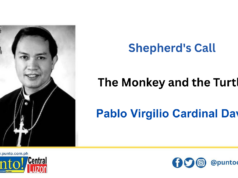THE TIMING described by John in our Easter morning Gospel is “early at dawn, while it is still dark.” The setting is a tomb in graveyard, a setting of death. There is grief on the part of Mary Magdalene; there is guilt on the part of Peter. There is silence on the part of John.
There is a situation of confusion; the body of Jesus is missing. The linen cloths are lying around. All three characters, Mary, Peter and John are running around, searching but not finding him. They are not just in physical darkness but also in a state of emotional and spiritual darkness.
Above all, it’s the FIRST DAY OF THE WEEK. Does all of this give you enough clue? Yes, of course you should know, if you remember your Bible—the story of creation on the first day of the week. Before God begins his work of creation, there nothing but a state of darkness, chaos and disorder. And then the Divine activity begins with a simple command: LET THERE BE LIGHT!
Now you should realize why we simulated that same darkness in our Easter Vigil celebration last night as we lighted a new Paschal Candle. It’s LET THERE BE LIGHT all over again! But this time, the light is given a name: CHRIST, OUR LIGHT!
What is RESURRECTION? It is NEW CREATION! It is not just about Jesus rising to new life but God starting the first day of the week of creation all over again by saying LET THERE BE LIGHT. And that new light is Christ, the One Word uttered by God to create the whole universe. He alone could drive away the darkness of grief that veiled Mary Magdalene and the darkness of guilt that weighed down on Peter.
First, let us look at the Darkness of Grief, represented by Mary Magdalene. Remember her dark past? Please, forget about linking her with prostitution. That has no basis in the Gospels at all. She is rather the one described by St. Mark as that woman “from whom the Lord drove away seven demons.” Back in those days, in her state of possession, she became fully unaware of herself, her own identity, her own name.
In the movie THE CHOSEN, after she is healed, she meets Nicodemus who had earlier attempted to exorcise her but failed. Nicodemus is shocked to find her back to her normal self. He addresses her by her old nickname, LILITH. She answers and says, “I don’t go by that name anymore. I am Mary.” Meaning, she is a new creation after being healed by Jesus.
Now in the darkness of grief, there is a risk of her plunging back to a state of “possession.” And so, when the risen Jesus meets her, he calls her by her name, MARY! That is enough to lift up her veil of grief. She is a new creation all over again!
How many people are veiled by grief in this time of pandemic. They need to hear their names pronounced by the risen Jesus in the midst of this darkness. This darkness is an invitation to become a new creation in Christ.
Next, we look at the Darkness of Guilt, represented by Peter. This man is also in the dark. He is lagging behind in the race to the tomb because he is running, not with heavy feet but with a heavy heart, a heavy conscience. He has failed the Lord. He is enveloped by the darkness of guilt and shame. He is too confused to even see any signs around him.
If the Lord is risen, he wouldn’t even want to see him. In John 21, we are told that when the risen Jesus appeared to him by the lakeshore, instead of excitedly running to embrace him, he jumped into the water, wanting to disappear in shame. John says “because he was naked” (which is a metaphor for shame and sinfulness).
John later describes the scene in Chapter 21: there is a bonfire and Jesus feeds him first before he asks him to feed his lambs. Jesus asks him three times, DO YOU LOVE ME? Only on the third time is the darkness of guilt dispelled by the light of forgiveness. He becomes a new creation, transformed by Christ’s unconditional love.
How many people are afflicted by fears and anxieties in this time of pandemic, and the thought that maybe they are being punished by God? How many people are feeling guilty about not having loved enough, about not having been physically present to care for their loved ones who died of Covid–19? In this darkness of guilt, we need to hear Jesus saying DO YOU LOVE ME? And he needs to hear the renewal of YES to him. A yes that will redirect us from self-absorption to care for the sheep, to feed his lambs. It is enough—to allow him to recreate us.
The old hymn says it well: “New life, new creation, alive our sense of wonder, the time has come to be reborn, the kingdom is right here. Do we know within us the call to change our hearts? If we do, the Spirit is alive in us!”
Finally, we should take a quick look at the third character, the silent one who simply calls himself the “Beloved Disciple.”
Like Mary and Peter, he is also running. But he runs swiftly. He is the one who silently notices the details which he interprets as signs, like the cloth that had been used to cover his head. “Yes, that’s my orderly Jesus, all right,” he probably said to himself, “he even found time to roll it separately on a corner! “
I imagine him with a glint in his eyes while he is absorbing it all. Just like he did by the lakeshore of Tiberias in John Chapter 21, he could only cry out in darkness, IT IS THE LORD! (He sees the light!) Even in the dark, he could discern his surroundings, because it is the darkness of DAWN, that time of the day when the Light is about to be born. And that Light is God’s Eternal Love in the Risen Lord who constantly recreates the world.
Dear brothers and sisters, on this Easter morning, in the midst of the darkness and chaos brought about by this pandemic, let us not surrender to despair. Let us not forget the words of Saint Augustine. WE ARE AN EASTER PEOPLE AND OUR SONG IS ALLELUIA!
I wish you all the Easter Blessings of peace, hope, joy and new life in our Risen Lord! Alleluia!
(Homily for Easter Sunday, 4 April 2021, John 20:1-9)





